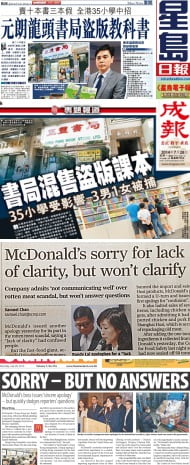Hong Kong starts the week panicking about pirated school textbooks. It’s a Big Deal because students pass exams by memorizing the content of set books. If the  book itself is faulty in some way – say by being out of date – the memorized content could be ‘wrong’, raising the possibility of failure in exams, a life of penury for the student and shame to the family for a thousand generations. The publishers make a lot of money by frequently ‘revising’ textbooks, making older versions a possible threat to academic success. The financial burden of having to buy endless new editions is obviously heaviest on poorer families. Since the government shows little interest in intervening in this blatant rip-off, we could argue that pirating is morally justifiable. Instead, HK Customs treats the items like poison.
book itself is faulty in some way – say by being out of date – the memorized content could be ‘wrong’, raising the possibility of failure in exams, a life of penury for the student and shame to the family for a thousand generations. The publishers make a lot of money by frequently ‘revising’ textbooks, making older versions a possible threat to academic success. The financial burden of having to buy endless new editions is obviously heaviest on poorer families. Since the government shows little interest in intervening in this blatant rip-off, we could argue that pirating is morally justifiable. Instead, HK Customs treats the items like poison.
Which brings us rather neatly to the local McDonalds operation, which sort of looks as if it deliberately misled the public about whether it knew it had been using possibly tainted meat from the Shanghai Husi company. In an attempt at damage control, the hamburger chain held a press-grovel yesterday. But the effort backfired when the local top manager simply read out a statement and refused to take questions. Her apology might have been sweet and sincere, but we will never know: the shunning of reporters became the story. You’d have thought a company that makes billions selling repulsive and unhealthy junk would have learnt this sort of thing by now.
For expertise in spin, we should look at the Standard’s ‘Mary Ma’ editorial column today, which manages to turn McDonalds’ problems into an opportunity to display patriotic pride…
Or at least, the mean-spirited and insecure whining that is a certain type of Chinese nationalism. That lamentable tendency could be the real story. Are Mainland authorities using tainted meat (which somehow hasn’t harmed anyone) to target big US brands, like McDonalds, KFC and so on? Are they using it as a way to target another American-owned company, Shanghai Husi – subsidiary of OSI Group of Illinois? Alternatively, are the food-health regulators doing their job well, and have they uncovered, and nipped in the bud, an actual scandal? Maybe we will find out some time. Meanwhile, OSI Group’s boss shows McDonalds HK how to do a convincing press-grovel.
For Hong Kong’s chattering classes, the big thing is the anti-Occupy Central campaign, which has now gathered more signatures than Occupy Central did in its ‘civil referendum’. They seem to have attracted especially strong support from the ‘illiterate old villager’ sector up in the New Territories. And to cap it all, Chief Executive CY Leung and most of his officials announce their endorsement of it.
This is so unwise, it can only be on Beijing’s orders. CY’s own instinct might be to sign up to the no-expense-spared, United Front petition, but the more level-headed of his colleagues like Chief Secretary Carrie Lam would surely know better. By taking part in a civil-society hate-fest, he ceases to be (however notionally) a leader for the whole community. By abandoning his above-it-all neutrality, he reduces himself to the role of leader for just part of the community, and even risks elevating Occupy organizer Benny Tai to a sort of equal status as leader of the (or an-) other part. At best, he loses any right to call for consensus or unity.
What other petitions will he sign in future? The one against construction of a mosque in the New Territories? The one against giving foreign domestic helpers a pay hike? The Society for Truth and Light’s campaign against gay marriage? One in favour of wantonly creating unnecessary divisiveness?
On a more positive note, an overseas newspaper finally gets it about Hong Kong. I have some misgivings about the Guardian, not least because of the almost self-parodying moralistic righteousness of its columnists and its even ghastlier readers, flaunting their superiority as vegetarians who adopt black babies (though maybe these really are made-up). But it hits the nail on the head today: Hong Kong’s political problem is simply its economic structure. And, the headline continues, the ‘elite’ knows it. As, now, does the overseas press. That just leaves the pro-dems.

